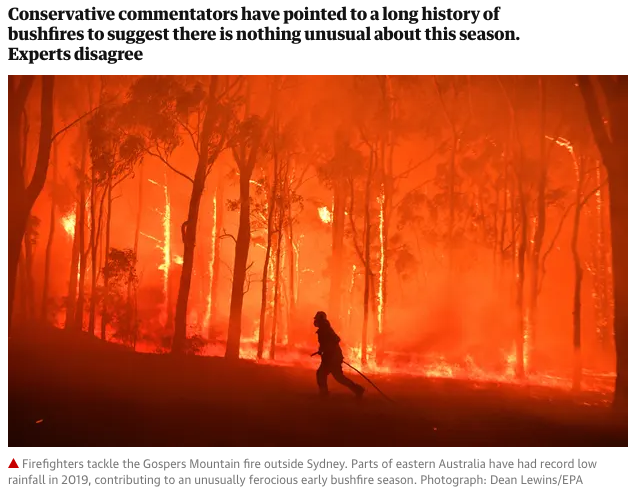 |
| There is no climate sceptic on the end of a fire hose. #jailclimatecriminals |
Governments must prepare for catastrophic fires.
* Establishing services to support those ‘burned out’ and those who cannot insure
* rezoning areas unsuitable for building
* changing building regulations
* employing indigenous people to carry out controlled burning to reduce fuel loads as they have done for thousands of years
* increasing the numbers of professional firefighters, giving more support to volunteer firefighters and purchasing more aviation support are just small steps.
* increasing funding for bushfire research
* the most important action for governments is to cut carbon targets and to pressure other countries to do the same. Tariffs on carbon reckless countries, like the USA, Saudi Arabia, China and Australia are inevitable.
 |
| Koalas suffered greatly. #jailclimatecriminals |
" The main reason more prescribed burning has not been done is the risk the deliberately lit fires will get out of control and burn down property, or otherwise choke population areas with unhealthy amounts of smoke.
This risk has gone up with the drought, which has meant there are fewer days every year with low-risk fire conditions. It's also gone up with population levels, which has meant more people are affected by prescribed burning.
 |
| #climatecrisis, heatwaves |
"With many prescribed burns now conducted close to the expanding urban fringe and close to essential infrastructure and agriculture, the community tolerance levels are very low to heavy smoke and potential damage to delicate ecosystems," Dr Thornton says."
".... Mr Bradstock described it as a "tired and old conspiracy theory" while Greg Mullins said ex-fire chiefs were annoyed that the fires were being used for political attack."
 |
| #bushfire, #wildfire, #jailclimatecriminals |
"Greg Mullins (former NSW fire and rescue commissioner Greg Mullins) said climate change means it's often too dangerous to
burn: "Extreme drought like this, underpinned by 20 years of reduced
rainfall, has meant the window for hazard reduction is very narrow now."
He also said a long-term reduction in forestry and national parks personnel has meant hazard reduction has fallen to volunteers.
How effective is hazard reduction?
Many bushfire experts want to see more hazard reduction, but they also say there's a danger in presenting prescribed burning and fuel management measures as a 'silver bullet solution' to the continent's increasing fire risk.Some areas are suitable for prescribed burning, while others are not.
"The complexities around hazard reduction burning are large and growing," said Dr Richard Thornton, CEO of the Bushfire and Natural Hazards Cooperative Research Centre."
https://www.abc.net.au/triplej/programs/hack/is-more-prescribed-burning-the-answer-to-bushfire-threat/11844766
See also: Preparing for heatwaves
Your Suggestions:
* Extra water tank on every house plus fire
fighter pump diesel.
* Only fleshy leaf trees near buildings

